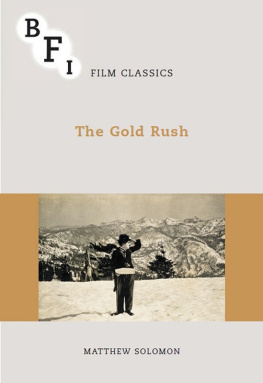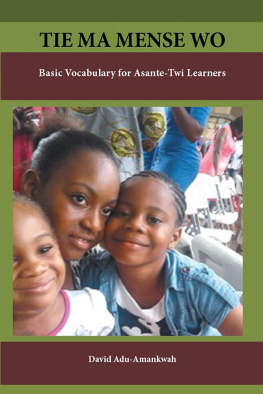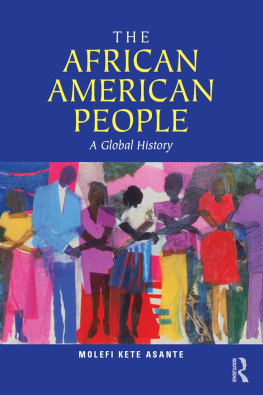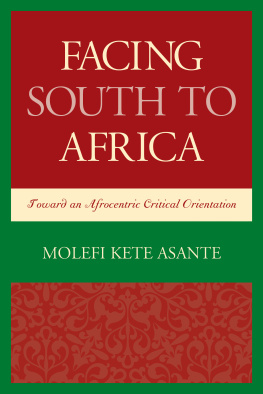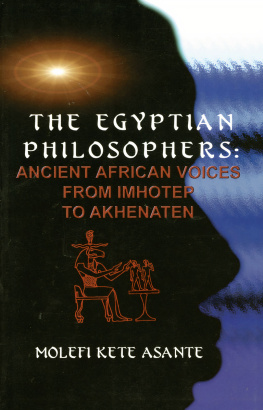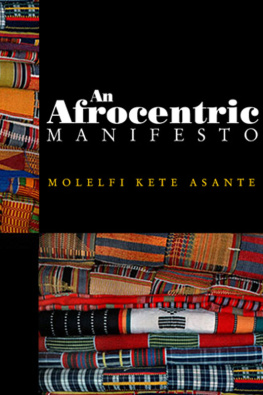Robert B. Edgerton
Copyright 1995 by Robert B. Edgerton
All rights reserved including the right of reproduction in whole of in part in any form.
THE FREE PRESS and colophon are trademarks of Simon & Schuster Inc.
Edgerton, Robert B.
The fall of the Asante Empire: the hundred-year war for Africas Gold Coast / Robert B. Edgerton.
p. cm.
Includes bibliographical references and index.
Ashanti (Kingdom)History. 2. Ashanti (African People)History. 3. GhanaHistory. I. Title.
For information regarding special discounts for bulk purchases, please contact Simon & Schuster Special Sales at 1-800-456-6798 or business@simonandschuster.com
Preface
W HEN DURING THE PAST CENTURY W ESTERNERS THOUGHT ABOUT Africa, it is unlikely that they paid much attention to the military prowess of the African societies that were reportedly being conquered with little difficulty by one European force or another. There was one notable exception. The dramatic 1879 war between the Zulus and the British immediately captured the imagination of people throughout the West. In the first great battle of their six-month-long war, the Zulus very nearly annihilated a large British force, killing 52 officers, 806 soldiers, and about 500 of their African allies. More than a century later, the pageantry of red-coated Britons wielding bayonets against the short stabbing spears of flamboyantly costumed, impossibly brave Zulu warriors continues to be celebrated in books, on television, and in epic motion pictures such as Zulu and Zulu Dawn. The extraordinary bravery and the military success of the Zulus earned them the respect of the British who fought against them and fascinated generations of Europeans and Americans, who have read about their resistance or seen it depicted in films. But for most people in Europe and America, recognition of the valor of African fighting men begins and ends with the Zulus. It has gone very largely unnoticed that both before and after the Anglo-Zulu war, African soldiers fought against invading European armies whose modern rifles, machine guns, and artillery killed them in terrible numbers. The men, and sometimes women, in these African armies were often gallant, and sometimes they won battles despite their inferior arms. But most of the battles these African soldiers fought made little impact on European consciousness at the time, and they have since faded into almost complete obscurity.
Some of the longest and most effective military resistance to European conquest took place in West Africa; by far the longest was the century-long struggle of the Asante of Ghana against the British. From 1807 to 1900, Asante armies fought numerous small and large battles against the British. In several of these they were the clear victors, the only West African army to defeat a European army in more than one major engagement. In the final conflict of 1900, despite the British use of machine guns and powerful 75mm artillery, the Asante several times forced British columns to retreat. One of the British invasions of the Asante kingdom was led by Sir Garnet Wolseley, Britains best-known general at the time and the man who later commanded British troops during the Zulu war. Wolseley had fought and been wounded in several previous wars, but he called his campaign against the Asante the most horrible war he had ever fought in. And he very nearly did not win it.
The Asante and the British fought more than one horrible battle. They fought bravely and cruelly as they struggled with disease and starvation as well as bullets and bayonets. Most of all they struggled with their colossal incomprehension of one anothers values, religious beliefs, diplomacy, sense of honor, and national purpose. Much of this misunderstanding was the inevitable consequence of the British insistence on their racial and cultural supremacy, but the Asante too could be arrogant and self-righteous. The roots of conflict lay in the differing cultural heritages and economic interests of the two peoples. Although the most fundamental cause of the conflict was economic, the Asante practices of human sacrifice and slavery also played a part, as did British ignorance about the significance of the Golden Stool. Not only did the two nations misunderstand one another, they consistently underestimated one anothers military strength.
What follows will describe the conflict between these two proud peoples, especially their military campaigns and something of the men who fought in them. The emphasis will be on the military resistance of the Asante, but that can only be understood by examining the actions of the British, not least because most of the firsthand accounts of these wars were written by them. Over the course of the nineteenth century, the Asante and British troops fought dozens of battles. Some were small-scale affairs fought more or less by mistake. Others were well-planned campaigns that involved many thousands of men. The Asante fought with such bravery that from the first battle to the last the British sang their praises. Despite an inferiority in weapons that grew as the years passed, the Asante willingness to face death in battle never wavered. How they fought and why they did so is the subject of this book.
Acknowledgments
T HIS BOOK DESCRIBES THE MILITARY CONFLICT BETWEEN THE Asante and British that filled the nineteenth century. In the mid-1980s, when my long-standing interest in this subject was piqued enough to start this project, all of those people who had firsthand knowledge of the events had passed on, and although searches of the Public Record Office in London, the Balme Library at the University of Ghana, the Basel Missionary Archives, the British Museum, and many other libraries and archives yielded much, I discovered nothing of major significance that previous scholars had missed.
Instead of continuing my frustrated search for something original, I found myself relying heavily on the published work of scholars, missionaries, soldiers, travelers, and newspaper correspondents. To modern-day scholars who find themselves cited in the bibliography, I extend my thanks for their marvelous work, as I do to all of those earlier merchants, missionaries, soldiers, colonial officers, and newsmen who braved inclement weather, deadly diseases, and bullets to record their experiences of that tumultuous century.
This book, like my two earlier books for The Free Press on African resistance to colonial ruleLike Lions They Fought and Mau Mauis meant mainly for the general reading public rather than scholars. To make the book as accessible as possible to these readers I have avoided the use of technical anthropological terms for various aspects of Asante society and culture, and I have held the use of Asante terms to an absolute minimum. For example, I have referred to the Asante monarch as king rather than Asantehene, the Asante term, which is routinely used by most scholars when referring to the holder of this office. I have also tried to reduce the number of place-names for villages, rivers, districts, and the like as well as the personal names of men and women whose roles were not central to the events being described. For this I apologize to the Asante people, but I hope that they will understand that my purpose is to make their history more easily understood to outsiders.


